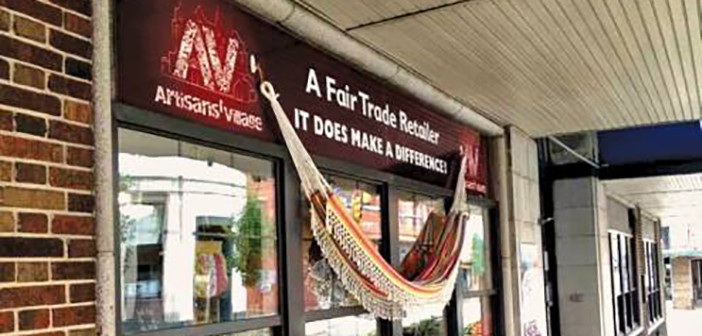By Sarah Colson
In April 2013, Michael and Leah Short of Johnson City decided to open a small fair trade store called Artisans’ Village on Main Street in downtown. Since then, the couple has been fighting human trafficking right here in East Tennessee with the power of retail and partnership.
“The folks that typically shop downtown have a very strong vision for justice and all that goes into making fair trade what it is,” Michael said.
Encouraged by downtown’s response to the fair trade store, and to further emphasize how local is the issue of trafficking, the Shorts have decided to partner with Thistle Farms, a fair trade production site that sells body care products in Tennessee.
Thistle Farms employs 1,000 women worldwide and 45 women from Tennessee, all of whom have survived prostitution, trafficking and/or addiction. The women from Tennessee are part of a two-year residential program called “Magdalene,” where they learn much needed work skills and earn fair wages.
Michael said, “Our big concern was accountability. We don’t want to partner with anyone that is not above board (or lacks) a quantifiable structure to a degree you can measure. They seem to be pretty successful at that.”
Sales at Thistle Farms reached a million dollars in 2014 and products are in 425 stores throughout Tennessee. The Shorts said they are excited to make Artisans’ Village one of those stores and hope the handmade bath and body care line and products from Thistle’s café will continue to help their store remain self-sustainable.
Michael also said selling Thistle Farms’ products in the store would allow the Shorts to broaden the store’s base. Now, Artisans’ Village has a strong reputation for selling coffee and chocolate. The Shorts hope by offering Thistle Farms products, that reputation will expand to other consumable products.
They’re also hoping the products will continue to help them bridge the gap between consumerism and responsible shopping.
“The store is less of a place to buy things and more of a platform to talk about the issues and get people excited and educated,” Michael said. “Now, what they do with that information is certainly up to them. That’s part of doing what we do is to talk to people and maybe inspire them to think a little bit differently about themselves and the world around them.”
The Shorts, along with their 5-year-old daughter, Emma, haven’t always been in the fair trade business. Before 2011, they were just a normal couple from Indiana. Michael worked as a car dealer in a family-owned dealership.
“We decided we wanted to do something with a purpose,” Leah said. “We wanted to do something with some kind of a mission involved with it; we wanted to have something that we really believed in.”
After traveling to Thailand where Leah’s parents were long-term missionaries, the couple decided to open up a fair trade store with a message they believed consumers needed to hear: All are made in the image of God. The shorts said they want to help people realize we are all children of God, not just “cogs in a machine.”
“We have to be aware,” Michael said. “We have to have information. You’re not going to get that in the media. You’re not going to get that from our government because they look at us as part of the GDP. And we are consumers. We are a consumer-driven economy.
That’s how our government and big business see us, as a part of that machine. We are so much more than that.”
Along with encouraging shoppers to think in this way, the Shorts said they hope to help Johnson Citians realize that trafficking forced labor workers are not just “over there” problems, but very local problems as well.
Michael said last August the Knoxville office of the FBI released a report saying there were 17 arrests of traffickers right here in East Tennessee. And just last weekend, on Independence Day, LaDaniel Mitchell and Jodi Robicheaux were charged in U.S. District Court with sex trafficking of a 16 year old girl at a motel in Knoxville. The couple allegedly forced runaways into prostitution and sold minors on Backpage.com. Both are being held without bond.
“We want to try to connect the dots for folks and help them understand that this is not just a Southeast Asia problem. This is not an Africa problem. This is not a South America problem. This is a people problem that is right here and unfortunately it is alive and well in the Tri-Cities,” Michael said.
After meeting with News & Neighbor, the Shorts met with the Washington County Economic Development Council, who they said have been very supportive of the store. They planned on brainstorming ways toward continued success and hope to begin selling Thistle Farms products by July 24.
For more information on Thistle Farms or Artisans Village, visit thistlefarms.org or email the Shorts at artisansvillage@centurylink.net.





